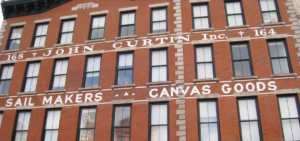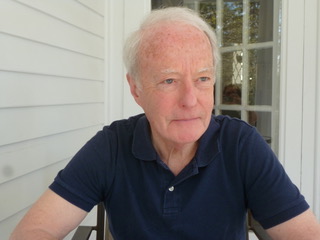
“Time present and time past
Are both perhaps present in time future
And time future contained in time past.
What might have been and what has been
Point to one end, which is always present.” – T.S. Eliot, The Four Quartets
“You can’t repeat the past,” says Nick Carraway to Jay Gatsby in F. Scott Fitzgerald’s The Great Gatsby, which was published one hundred years ago this spring.
Gatsby responds incredulously, “Can’t repeat the past? Why of course you can!”
This often quoted exchange is typically used to exhibit Gatsby’s delusions, but he may have been right, in the wrong way.
A deep reading of the book suggests it offers the perfect description of today’s political and cultural life, in Nick’s words: “a satisfactory hint of the unreality of reality, a promise that the rock of the world was founded securely on a fairy’s wings.”
Commentating on the Roaring Twenties as they started to meow, Fitzgerald later wrote, “By 1927 a widespread neurosis began to be evident, faintly signaled, like a nervous beating of the feet, by the popularity of crossword puzzles.” He said that once “pretty much of anything went“ at Cap d’Antibes on the French Riviera near where he and his wife Zelda had lived for a while. It also was an apt description of New York City and other places where the wild life of the post-World War I reaction was in full force. It was not just speakeasies, jazz, and a sexual revolution, but the first full-blown phase of the technological and commercial world we know today. The 1920s’ modernism, with its ethos of the prohibition to prohibit still somewhat limited to certain cities, was the seedbed for postmodernism’s vastly expanded and deeper rooted transformation of cultural mores today where anything goes.
But by the late 1920s, tamed by political and economic world events, personal disillusionment from the war’s reality, and hangovers from unbridled excess, dispirited days followed, only to be followed by deeper depressions emanating from the stock market crash, followed by the Great Depression, and World War II.
Nevertheless, in 1934 Cole Porter wrote the song, Anything Goes, for the musical by the same name, that, despite being censored for its naughty lyrics, captured in witty words the aftereffects of a world where the old mores were dying as the world was sailing into disaster on a ship of fools.
In olden days, a glimpse of stocking
Was looked on as something shocking
But now, God knows
Anything goesGood authors too who once knew better words
Now only use four-letter words
Writing prose
Anything goes
………………………………………………………………………
The world has gone mad today
And good’s bad today
And black’s white today
And day’s night today
………………………………………………………………………
Just think of those shocks you’ve got
And those knocks you’ve got
And those blues you’ve got
From that news you’ve got
And those pains you’ve got
If any brains you’ve got
It was also in the mid-nineteen thirties that Fitzgerald penned three essays for Esquire magazine about his personal breakdown that were posthumously collected in 1945 in The Crackup. Fitzgerald barely made it through the 1930s, dying in 1940 as WW II was underway, the confirmation that WW I was not “the war to end all wars.”
From “shell shock” to economic shock to “combat fatigue” to post-traumatic stress disorder (PTSD), the wars rolled on over millions of corpses and destroyed countries. They roll on still. The toll on the combatants and victims is obvious, but the crackups among those who danced through the carnage or sat fat and seemingly satisfied or indifferent remains unknown.
Still does, as indifference reigns with bi-partisan savagery hidden behind illusory party politics that shroud rule by the monied class via a systemic duopoly. Their elitism and materialism – for which some critics have dismissed Fitzgerald’s book because he describes and castigates its ugly characters and their careless indifference to regular people – define the lifestyles of those who today own the country yet are the envy of so many people besotted by celebrity worship and wish they too were immoral billionaires running the show.
Gatsby is set in the 1920s, but one could easily rewrite the story today – because it is a recurring American tragedy and is repeating – with some figure like Donald Trump cast as Gatsby. But Gatsby or Trump or Daisy or the racist Tom Buchanan are gross symptoms of a class system of domination. As individuals, they are replaceable, revolving characters in a structural order that repeats and repeats.
The character of Jay Gatsby and his luxurious life may be Hollywood’s focus (as are the grotesqueries of today’s celebrities and media billionaires), but the narrator of Fitzgerald’s book, Nick Carraway, who participated in WW I and who, to disguise his torment, says – that he “enjoyed the counterraid so thoroughly” – is the key. Speaking facetiously can hide a lot of pain. Fitzgerald threw a lot of his pain into The Great Gatsby. Despite its glittering surface, it is the story of lost souls, and Fitzgerald was one of them, but by writing the book he strove to find what he had lost.
If this sounds at all familiar, it may be because you are thinking of today’s focus on rich celebrities like Gatsby and Trump who pepper the news, convoluted intimations of disaster both martial and economic, and the popularity of the web based Wordle puzzle and its offshoots as well as crossword puzzles (more about pop cultural reference words these days) – among other similarities to the moribund 1920s.
What’s the right word to describe what is underway today?
Clearly there is a widespread anxiety as in the late 1920s – now a tapping of nervous fingers on billions of cells – that we are involved in a puzzle that needs solving yet are running out of chances to find the right word to characterize it, not to say solve it. For Wordle devotees, it couldn’t be “repeat” since that has six letters. How about “rerun”? That fits Wordle’s numerical format and today’s video world but leaves the question: rerun of what?
Would “havoc” work, or do we need something much stronger that doesn’t fit within the strictures of word games? Catastrophe?
WW III? A Greater Depression?
Last night I had a very disturbing dream. I am not making this up. I was in a car that was also a house with a woman I know and her mother. The woman put the car on automatic self-drive to go backwards and it was proceeding down a dark country road. I was greatly agitated as we traveled automatically backwards, “borne back ceaselessly into the past,” as Fitzgerald ends his book, and I told the woman I would ask her twenty-five times to reverse our direction or I would leave. She refused twenty-five times and I left.
I am not opposed to looking back, but not automatically. Going back by choice to come forward wiser and more enriched by all experiences – good and bad – is an essential journey.
Was my dream a premonition of what I am writing here, a prologue to my musings about The Great Gatsby, which I had been rereading for a reason unconnected to its centennial? Perhaps. For are our dreams not telling us something important, something far greater than, but not excluding, our personal lives?
When he died, Fitzgerald was working in Hollywood, the Dream Factory, where one can imagine he might still have harbored Gatsby’s “colossal vitality of his illusion,” even as his physical health deteriorated after years of very heavy drinking.
I have come back by train and choice with the woman of my dreams for a short visit to New York City where I was born and grew up. All is changed, changed utterly, yet it remains the same, filtered through memory. It is not repetition but a reminder.
The train coming into the city flashed quickly by an apartment building at 204th Street in the Bronx where I recalled hearing as a twelve year old the news that our nice neighbor’s wife, Mrs. Schwartz, had jumped to her death onto the tracks, a Bronx Anna Karenina. It was April 29th – my mother’s birthday.

After arrival at Grand Central Station, our peregrinations took us past our old railroad flat with its rascally stairwell, as our four year-old daughter used to describe it. On Atlantic Avenue in Brooklyn John Curtin’s name still poses prominently for his sail making company, a reminder of a time when people as well as answers were blowing in the wind. In a park I met the white dove who might have sailed many seas and once slept in the sand but now pigeon-toes its way back and forth at my feet, cooing messages that entrance my unknowing mind. In Central Park, where as high school student I would train for basketball season by running around the reservoir track and later would wander dreamily looking for girls and watch Shakespeare plays at the Delacorte Theater, we dawdled under an avenue of cherry blossom trees whose blossoms flew like snow with the slightest breeze and little children screamed and ran in circles of delight and we silently lost ourselves in reveries of life’s ephemerality. Didn’t Eliot say that “the leaves were full of children,/Hidden excitedly, containing laughter. /Go, go, go, said the bird: human kind/Cannot bear very much reality”?

Scott Fitzgerald was right, when at the age of twenty-eight he realized through the voice of Nick Carraway that the future recedes before us year by year. It is the thought of a much older man, or a man who senses his mode of life is wrong and doomed. But he knew too that we are always “borne back ceaselessly into the past.” Dying at the age of forty-four, his past was quite brief and his future expunged.
But no matter how long or short our lifespans and no matter how fine or tragic our lives, everything and everyone who have passed through them are ours to accept or reject. One time and one time only – for every time is that one time – do we have a chance to say yes or no, to affirm or deny that everything is connected, is one. That we are who we were with all our experiences. And as Friedrich Nietzsche said, “ … if ever you wanted one thing twice, if ever you said, ‘You please me, happiness! Abide, moment!’ then you wanted all back. All anew, all eternally, all entangled, ensnared, enamored.” The good and the bad, all your life; for it is yours, no other’s.
It might sound strange that my thinking about Nietzsche brought me back to read The Great Gatsby. I first read it long ago, in high school as I recall, Regis High School, that sits on the upper east side of Manhattan between Park and Madison Avenues, a neighborhood where during four years, between my travels back and forth on the subway to and from my Bronx home, I would encounter the world of the very wealthy. Sometimes on cold evenings before basketball games, I would walk the neighborhood, mentally preparing to play my best. On Park Avenue I would watch the cabs and limousines glitter as they went back and forth, picking up and disgorging their rich passengers. Two blocks over on Fifth Avenue I would see women in mink coats walking little dogs in racoon wraps coming and going from doors opened and closed by doormen. I would often wonder what the doormen thought, having a great beloved uncle Nealy who was one. I thought that Gatsby, while wishing to also be treated with that old money obeisance, might think their wealth was also gotten by stealth, but of the legal kind. He would have been right in most cases. These thoughts that interrupted my game preparations stay with me still.
Nietzsche was always preoccupied with the connection between literature and life. He believed in making a work of art out of himself. He saw his own life as a narrative and authors’ best moments in their work. “The ‘work,’ he wrote, whether of the artist or the philosopher, invents the person who has created it, who is supposed to have created it: ‘the great,’ as they are venerated, are subsequent pieces of wretched minor fiction.”
On the train back from the city, May 1, the date of my father’s death, I read this from Freddy, as I have come to call my literary friend Nietzsche, who, despite his reputation, ironically or not, took Jesus very seriously, and who in his own way repeats his teaching that the kingdom of God is here now:
And if we consider that every human action, not only a book, is in some way or other the cause of other actions, decisions, and thoughts; that everything that happens is inseparably connected with everything that is going to happen, we recognize the real immortality, that of movement – that which has once moved is enclosed and immortalized in the general union of all existence like an insect within a piece of amber.
So do you think Gatsby was right in one way and right in the wrong way – that as individuals we not only can repeat our pasts but should (as in affirm them, not redo them) – because by doing so we take full responsibility for our identities, become who we are, assert our freedom, and immortalize our lives?
I do.
I do too, she said. Celebrate “the transitory enchanted moment” and eternity recurs! The eternal return.

As for the circumstances of our lives that we were tossed into and couldn’t control, accept them also. But from this moment on, our only time, let us try to create a social order where a book like The Great Gatsby never has to be written again, to make the world it describes a bad dream, so we can say with Nick Carraway that that “party’s over.”

A treasure trove of inspirational nuggets for intellectual mining. Kudos, Ed!